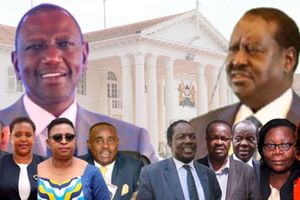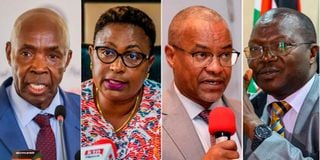
Former Cabinet Secretaries (from left) Ezekiel Machogu, Aisha Jumwa, Zachariah Njeru and Simon Chelugui.
From wielding immense power to navigating political obscurity, former cabinet secretaries sacked by President William Ruto following youth-led anti-government protests in July last year now live in the shadows, far from the limelight of their former roles.
Once towering figures in the Kenya Kwanza administration, the ousted ministers now navigate life far from the corridors of power, their influence reduced to mere whispers of a bygone era.
Stripped of their portfolios following massive protests against the Ruto administration that peaked in June and July 2024, they now find themselves adrift, grappling with the stark reality of political trifle after their sudden fall from grace.
Their glory days in government now a distant memory, they face the challenge of reinventing themselves in a political landscape that has left them behind.
While some of their colleagues made a comeback to the cabinet and others found a new footing in government, lady luck did not smile on Simon Chelugui (Co-operatives and Micro, Small and Medium Enterprises Development), Aisha Jumwa (Gender, Culture, the Arts and Heritage), Ezekiel Machogu (Education), Zachariah Njeru (Water, Sanitation and Irrigation), Mithika Linturi (Agriculture and Livestock Development).
Others include Susan Nakhumicha (Health), Peninah Malonza (East African Community, the ASALs and Regional Development), Florence Bore (Labour and Social Protection) and Njuguna Ndung’u (National Treasury and Planning).
Although he no longer wields State power, Mr Machogu says his lifestyle has changed, as he can now enjoy the freedom to switch off his phones and sleep comfortably — far removed from the constant emergencies and high-pressure demands he faced while serving in the Cabinet.
“I must confess that the job was quite straining. I used to wake up so early to get to the office by 6am and leave late, arriving home past 9 pm,” the former Education Cabinet Secretary told Nation.Africa.
“Now, I can wake up at 6am, do my morning exercises well and get to my private business by 8am,” he added.
Mr Machogu, a career civil servant and former Nyaribari Masaba MP who served at different levels in government, says that following his ouster, he needs to settle down with his private business and create employment opportunities for other Kenyans.
“I thank the Almighty God and the president for giving me the opportunity to serve as a cabinet minister, a higher position in the government. I don’t think I need any job now, let me be. I can serve the country in a different capacity, creating employment for the youth in the private sector,” he told Nation.Africa.
He underscored his role in the Education sector, mentioning key reforms, including implementation of the Competency Based Curriculum and increasing the number of technical and vocational institutions, which he noted he was proud to be associated with.
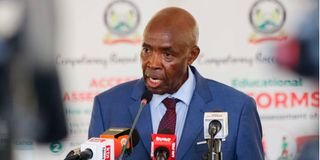
Former Education Cabinet Secretary Ezekiel Machogu.
For Mr Chelugui, who was the only former minister from Uhuru Kenyatta’s Jubilee administration to make it to President Ruto’s first cabinet after his victory in the 2022 elections, his life is now fully in the private sector.
During the turbulence that rocked the Jubilee administration and the fallout between President Kenyatta and his then Deputy Dr Ruto, Mr Chelugui openly aligned himself with the second in command unlike his counterparts who feared political persecution.
Even though Mr Kenyatta did not dismiss him, Mr Chelugui, who was then Cabinet Secretary for Water, faced tribulations, including being summoned by the anti-graft agency over the collapse of Itare and Kimwarer Dams in Nakuru and Elgeyo-Marakwet Counties respectively.
President Ruto has since promised that his administration will revive the two projects in the near future.
Mr Chelugui says that he has been forced back to the private sector to eke a living after the Cabinet was dissolved in July 2024.
“I went back to private sector in the water, energy and mining sector. I also do dairy farming value addition and ranching,” he told Nation.Africa in an exclusive interview.
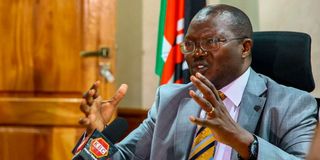
Simon Chelugui, the former Cabinet Secretary in the Ministry of Co-operatives and Micro, Small and Medium Enterprises Development.
He described his time in the Cabinet as a success, highlighting key achievements such as the construction of Chemususu Dam in Baringo and Thwake in Makueni County which had stalled for many years.
"We accelerated many projects in the sector and also launched key reforms and I am happy that we pushed national water coverage to historic levels," he stated.
Ms Jumwa appreciates President Ruto’s move to make her the first woman minister from the Mijikenda ethnic group.
“I thank God and forever grateful to President William Samoei Ruto for making the impossible to be possible by appointing me the first Mijikenda woman to his Cabinet,” she told Nation.Africa.
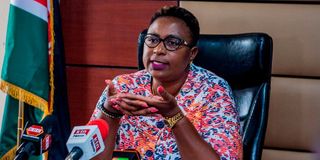
Politician Aisha Jumwa.
She also reflected on her life outside the cabinet, terming it “fulfilling in different ways.”
“I have dedicated my time to community empowerment through initiatives like the Aisha Jumwa Foundation, which focuses on supporting vulnerable groups, particularly teen mothers. I also engage with grassroots organizations to address pressing issues such as youth unemployment, education, and climate change,” she says.
Ms Jumwa adds that through this, she has been able to “reconnect deeply with the community and advocate for sustainable development at the local level.”
She says that since service to the nation is a lifelong commitment, she would gladly accept any state role.
“If called upon to serve again, I would embrace the opportunity with dedication and humility. My passion for transformative leadership and community development remains unwavering, and I believe my experience positions me to contribute meaningfully in any capacity,” said Ms Jumwa.
Mr Njeru, who served as Lands and later Water, Sanitation and Irrigation Cabinet Secretary before he was relieved of his duties in July, says he has lately resorted to farming.
"Since leaving office, I have remained highly engaged, maintaining a fulfilling and productive schedule. I have embraced this new chapter with optimism, focusing on making meaningful contributions to both my community and the business world,” he says.
He explains that his days are centred around a variety of ventures, including a recent foray into farming, which has been both challenging and rewarding.
“I am also committed to sharing my knowledge and experience by mentoring young professionals, offering guidance through advisory roles, and participating in forums that address key national and community issues,” he says.
The former Cabinet Secretary adds: “I’ve also made personal development a priority, dedicating time to health, wellness and staying informed about national developments. This balanced approach has allowed me to recharge and prepare for future opportunities to serve and contribute to the betterment of society.”
Life after office, he explains, has been a dynamic and enriching experience and “I’m excited about the possibilities that lie ahead."
Mr Njeru says that given another opportunity in any capacity to serve the public, he would use his skills, experience and insights he gained while serving as Cabinet Secretary to deliver.
“The skills, experience, and insights I gained while serving as Cabinet Secretary are still very much at my disposal, and I am eager to put them to good use again. I believe in the importance of continuous learning and adaptability,” he says.
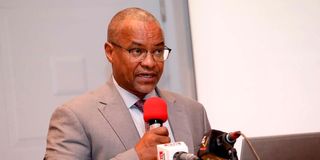
Former Cabinet Secretary Ministry in the Ministry of Water, Sanitation and Irrigation Zachariah Njeru.
Mr Njeru adds that if given an opportunity to serve in any capacity, he would bring a fresh perspective.
“I’m ready, willing, and confident that I can contribute meaningfully in any role the President or government deems appropriate,” Mr Njeru says
Mr Linturi, who last served as Agriculture Cabinet Secretary, declined to reveal what he was currently doing to eke a living.
“We can organize for a visit of where I work when convenient,” Mr Linturi told Nation.Africa, while Ms Nakhumicha talked of having excelled as Health Cabinet Secretary before she was removed from office.

Former Cabinet Secretary in the Ministry of Agriculture and Livestock Development Mithika Linturi.
“You know my success. It speaks for itself,” she told Nation when reached for comment.
On their part, Ms Malonza and Ms Bore did not immediately respond to enquiries from Nation.Africa.
As they languish in the periphery, some of their colleagues were lucky to make their ways back to the cabinet after their temporary dismissal.
Those who returned to what President Ruto referred to as a broad-based government, which included allies of veteran politician Raila Odinga, are; former Interior cabinet secretary Kithure Kindiki who was elevated to the Deputy President position after the impeachment of Rigathi Gachagua; Kipchumba Murkomen who was moved from Roads and Transport to Sports and now Interior; Aden Duale (moved from Defence to Environment); Alice Wahome (Lands), Alfred Mutua (moved from Tourism and Wildlife to Labour); Rebecca Miano (from Investments, Trade and Industry to Tourism); Soipan Tuya (from Environment to Defence),
Others are; Davis Chirchir (moved from the CS for Energy and Petroleum and taken to Roads and Transport), Salim Mvurya (moved from Mining, Blue Economy and Maritime Affairs to Sports); and former Attorney General Justin Muturi (now Public Service Cabinet Secretary).
Former Information, Communications and the Digital Economy Cabinet Secretary Eliud Owalo was appointed as Deputy Chief of Staff, Performance and Delivery Management while ex-Public Service CS Moses Kuria was appointed by the president as a Senior Advisor in his Council of Economic Advisors.
Former Sports Cabinet Secretary Ababu Namwamba also recently secured a role as the Permanent Representative of Kenya to the United Nations Environment Programme in Nairobi.
In President Ruto’s latest cabinet changes in December 2024, he redeployed former ICT Cabinet Secretary Margaret Nyambura Ndung’u as a nominee for High Commissioner to Ghana while her Agriculture counterpart Dr Andrew Karanja was nominated as Kenya’s ambassador to Brazil.
President Ruto has, however, hinted at offering more opportunities to his sacked CSs to be able to serve under his administration.
“I want to tell you that I will not leave my sister Aisha Jumwa out of my government. She is my sister, she will walk with me, I will not leave her. She will come back and walk with me alongside Blue Economy and Mining Cabinet Secretary Hassan Joho and his Investment and Trade counterpart Salim Mvurya,” said the Head of State in Watamu last year.
The President was forced to form a broad-based government, bringing in members from the opposition into his cabinet.
Former top ODM officials included in the government are Mr Hassan Joho (Cabinet Secretary for Mining, Blue Economy and Maritime Affairs), Mr Wycliffe Oparanya (Cabinet Secretary for Cooperatives and MSME Development), Mr John Mbadi (National Treasury and Economic Planning Cabinet Secretary), Mr Opiyo Wandayi (CS for Energy and Petroleum) and Ms Beatrice (Cabinet Secretary for East Africa Community, ASALs and Regional Development).
Additionally, President Ruto recently named other allies of Mr Odinga to plum state positions, even as he also brought in politicians linked to former President Kenyatta.
Prof Adams Oloo, Mr Joe Ager and Dr Sylvester Kasuku – all allies of Mr Odinga – are now part of President Ruto’s Council of Economic Advisers.
In rewarding former president Kenyatta’s allies, President Ruto tapped Mr Mutahi Kagwe, who served in Mr Kenyatta’s Cabinet, to take charge of the Agriculture and Livestock Development docket, if approved by Parliament this month.
He also nominated former Nakuru Governor Lee Kinyanjui, another close ally of Mr Kenyatta, to the Ministry of Investment, Trade and Industry.
Former Kiambu Governor William Kabogo also landed a ministerial nomination after he was picked to serve as Information, Communication and Digital Economy Cabinet Secretary.
The three nominees are expected to be vetted by the National Assembly on January 14.



